Description
ONE
Yoga as Rejected by Arjuna
There have been many yoga systems popularized in the Western world, especially in this century, but none of them have actually taught the perfection of yoga. In the Bhagavad-gītā, Śrī Kṛṣṇa, the Supreme Personality of Godhead, teaches Arjuna directly the perfection of yoga. If we actually want to participate in the perfection of the yoga system, in Bhagavad-gītā we will find the authoritative statements of the Supreme Person.
It is certainly remarkable that the perfection of yoga was taught in the middle of a battlefield. It was taught to Arjuna, the warrior, just before Arjuna was to engage in a fratricidal battle. Out of sentiment, Arjuna was thinking, “Why should I fight against my own kinsmen?” That reluctance to fight was due to Arjuna’s illusion, and just to eradicate that illusion, Śrī Kṛṣṇa spoke the Bhagavad-gītā to him. One can just imagine how little time must have elapsed while Bhagavad-gītā was being spoken. All the warriors on both sides were poised to fight, so there was very little time indeed – at the utmost, one hour. Within this one hour, the whole Bhagavad-gītā was discussed, and Śrī Kṛṣṇa set forth the perfection of all yoga systems to His friend Arjuna. At the end of this great discourse, Arjuna set aside his misgivings and fought.
However, within the discourse, when Arjuna heard the explanation of the meditational system of yoga – how to sit down, how to keep the body straight, how to keep the eyes half-closed and how to gaze at the tip of the nose without diverting one’s attention, all this being conducted in a secluded place, alone – he replied,
yo ’yaṁ yogas tvayā proktaḥ
sāmyena madhusūdana
etasyāhaṁ na paśyāmi
cañcalatvāt sthitiṁ sthirām
“O Madhusūdana, the system of yoga which You have summarized appears impractical and unendurable to me, for the mind is restless and unsteady.” (Bg. 6.33) This is important. We must always remember that we are in a material circumstance wherein at every moment our mind is subject to agitation. Actually we are not in a very comfortable situation. We are always thinking that by changing our situation we will overcome our mental agitation, and we are always thinking that when we reach a certain point, all mental agitations will disappear. But it is the nature of the material world that we cannot be free from anxiety. Our dilemma is that we are always trying to make a solution to our problems, but this universe is so designed that these solutions never come.
Not being a cheater, being very frank and open, Arjuna tells Kṛṣṇa that the system of yoga which He has described is not possible for him to execute. In speaking to Kṛṣṇa, it is significant that Arjuna addresses Him as Madhusūdana, indicating that the Lord is the killer of the demon Madhu. It is notable that God’s names are innumerable, for He is often named according to His activities. Indeed, God has innumerable names because He has innumerable activities. We are only parts of God, and we cannot even remember how many activities we have engaged in from our childhood to the present. The eternal God is unlimited, and since His activities are also unlimited, He has unlimited names, of which Kṛṣṇa is the chief. Then why is Arjuna addressing Him as Madhusūdana when, being Kṛṣṇa’s friend, he could address Him directly as Kṛṣṇa? The answer is that Arjuna considers his mind to be like a great demon, such as the demon Madhu. If it were possible for Kṛṣṇa to kill the demon called the mind, then Arjuna would be able to attain the perfection of yoga. “My mind is much stronger than this demon Madhu,” Arjuna is saying. “Please, if You could kill him, then it would be possible for me to execute this yoga system.” Even the mind of a great man like Arjuna is always agitated. As Arjuna himself says,
cañcalaṁ hi manaḥ kṛṣṇa
pramāthi balavad dṛḍham
tasyāhaṁ nigrahaṁ manye
vāyor iva suduṣkaram
“For the mind is restless, turbulent, obstinate and very strong, O Kṛṣṇa, and to subdue it is, it seems to me, more difficult than controlling the wind.” (Bg. 6.34)
It is indeed a fact that the mind is always telling us to go here, go there, do this, do that – it is always telling us which way to turn. Thus the sum and substance of the yoga system is to control the agitated mind. In the meditational yoga system the mind is controlled by focusing on the Supersoul – that is the whole purpose of yoga. But Arjuna says that controlling this mind is more difficult than stopping the wind from blowing. One can imagine a man stretching out his arms trying to stop a hurricane. Are we to assume that Arjuna is simply not sufficiently qualified to control his mind? The actual fact is that we cannot begin to understand the immense qualifications of Arjuna. After all, he was a personal friend of the Supreme Personality of Godhead. This is a highly elevated position and is one that cannot be at all attained by one without great qualifications. In addition to this, Arjuna was renowned as a great warrior and administrator. He was such an intelligent man that he could understand Bhagavad-gītā within one hour, whereas at the present moment great scholars cannot even understand it in the course of a lifetime. Yet Arjuna was thinking that controlling the mind was simply not possible for him. Are we then to assume that what was impossible for Arjuna in a more advanced age is possible for us in this degenerate age? We should not for one moment think that we are in Arjuna’s category. We are a thousand times inferior.
Moreover, there is no record of Arjuna’s having executed the yoga system at any time. Yet Arjuna was praised by Kṛṣṇa as the only man worthy of understanding Bhagavad-gītā. What was Arjuna’s great qualification? Śrī Kṛṣṇa says, “You are My devotee. You are My very dear friend.” Despite this qualification, Arjuna refused to execute the meditational yoga system described by Śrī Kṛṣṇa. What then are we to conclude? Are we to despair the mind’s ever being controlled? No, it can be controlled, and the process is this Kṛṣṇa consciousness. The mind must be fixed always in Kṛṣṇa. Insofar as the mind is absorbed in Kṛṣṇa, it has attained the perfection of yoga.
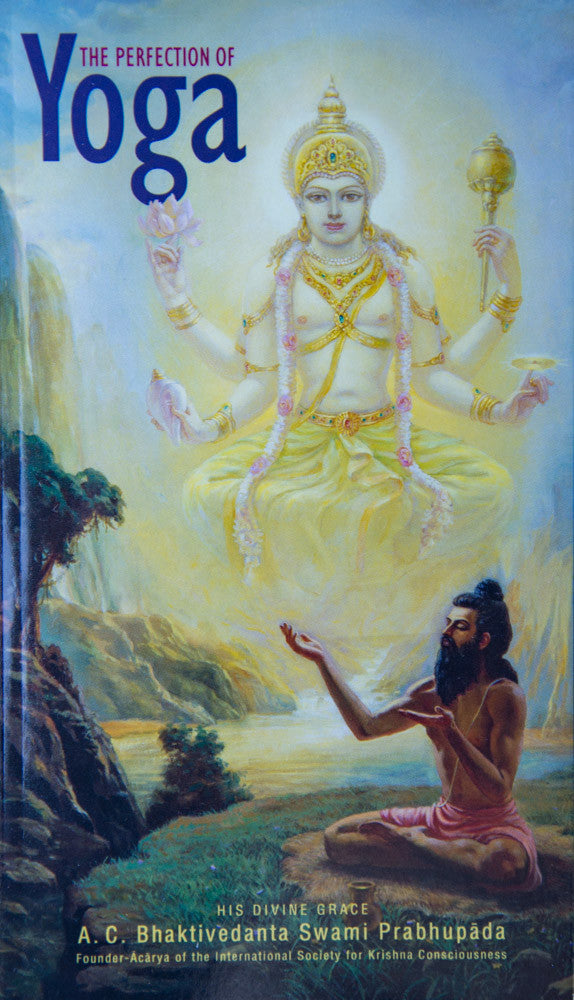
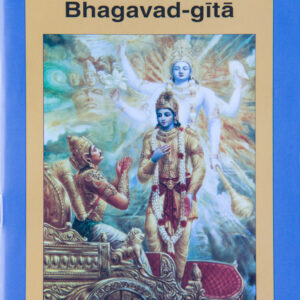
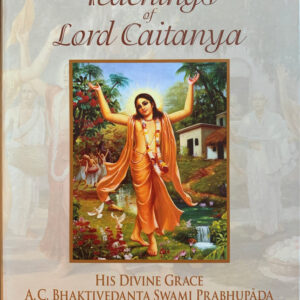


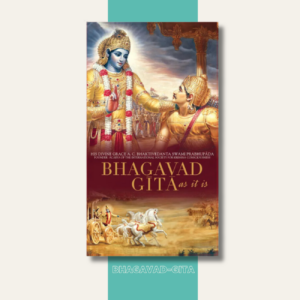
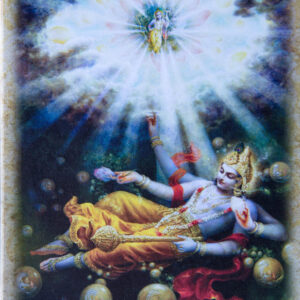
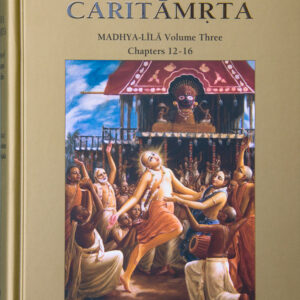
Reviews
There are no reviews yet.